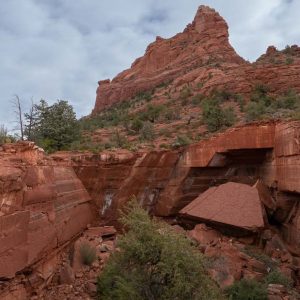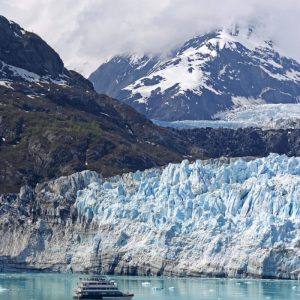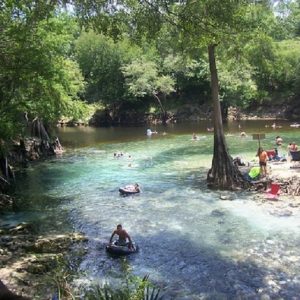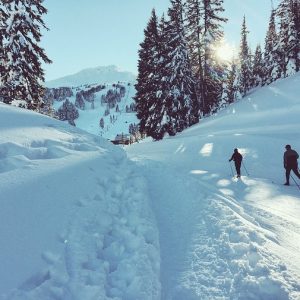I’ll admit it: I found myself stifling a laugh as I watched back some GoPro video my husband Elliot had filmed while climbing a via ferrata route in West Virginia. As he reached the top of a cliff face and looked around the corner to see cables and foot holds suspended over a completely sheer drop, he said, very matter-of-factly: “Oh well that’s terrifying.”
A “healthy fear of heights,” as NROCKS officially calls it on their website, is perfectly normal when you’re climbing cliff faces and dangling off rock walls like you do on a via ferrata. Elliot definitely has that healthy fear.
Me, though? Heights don’t really bother me. Which is probably why when I saw video of this particular activity, my first and only thought was, “That. Looks. AWESOME.”
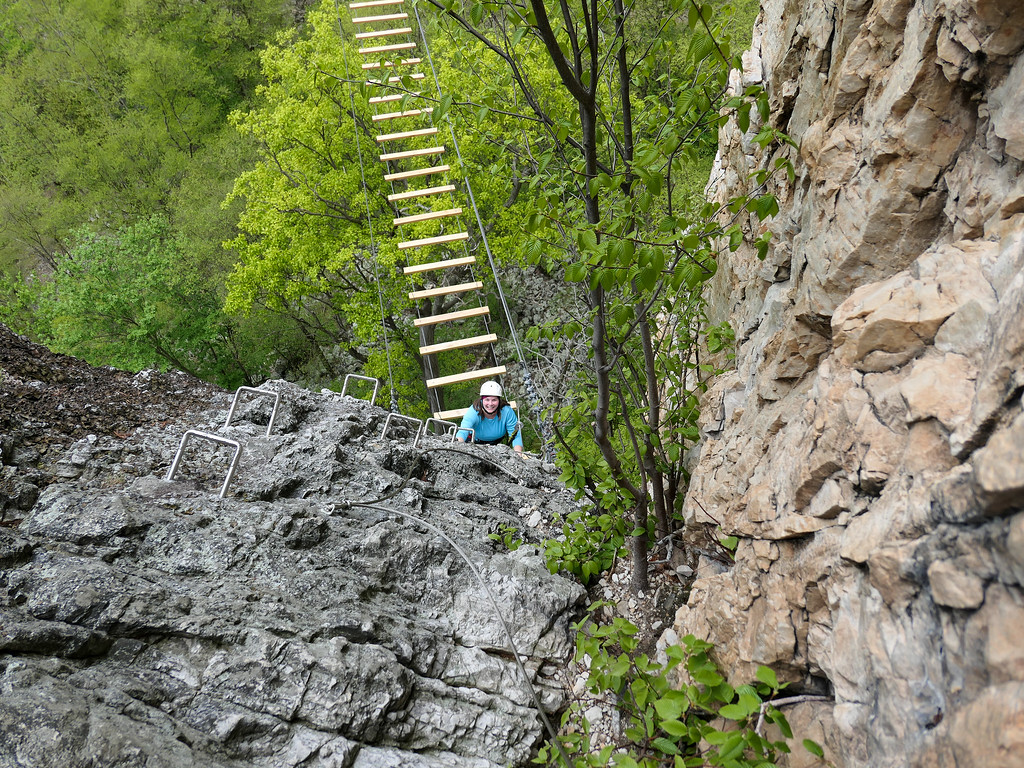
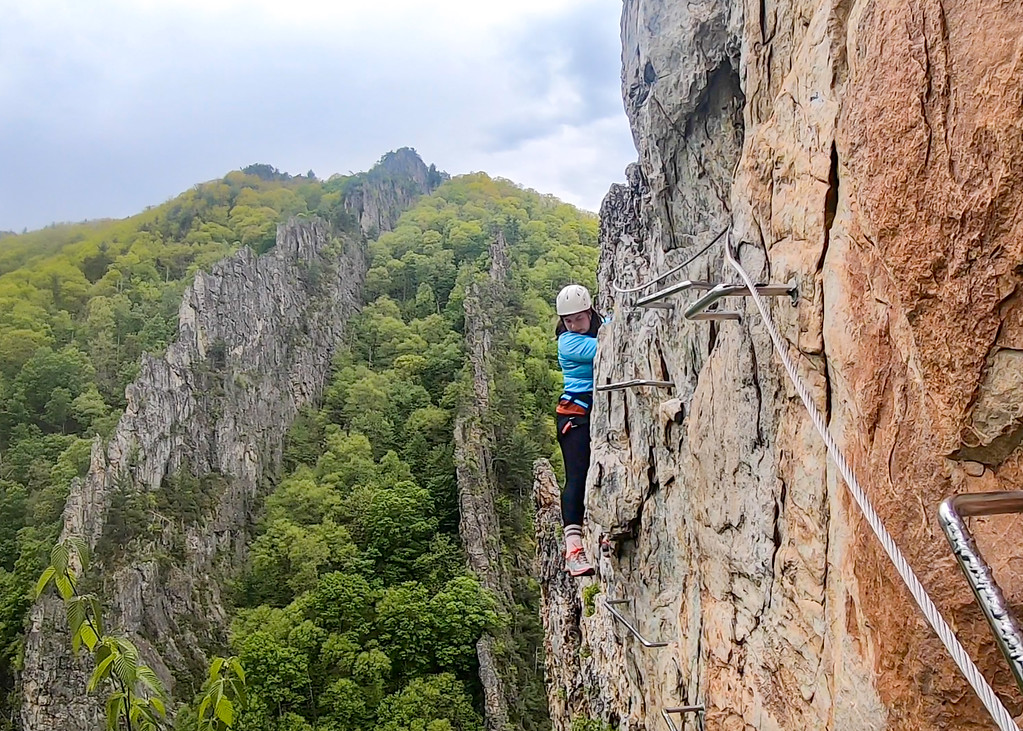
Contents
What is a via ferrata?
Let’s back up a second, though. If you’ve never seen the phrase via ferrata before, you might be wondering what the hell I’m talking about.
“Via ferrata” is an Italian phrase that translates to “iron road” or “the iron way,” and describes a climbing route in the mountains that melds hiking with rock climbing. The very first via ferratas were built as a way to traverse tricky mountain passes, and were most famously used during WWI to help move troops through the Alps.
Now, though, they are mostly used for recreation. A typical via ferrata route is comprised of a series of steel cables, metal rungs, ladders, bridges, steps, and other fixtures. Climbers don helmets and harnesses, and use a set of leashes and carabiners to affix themselves to the cable system as they climb.
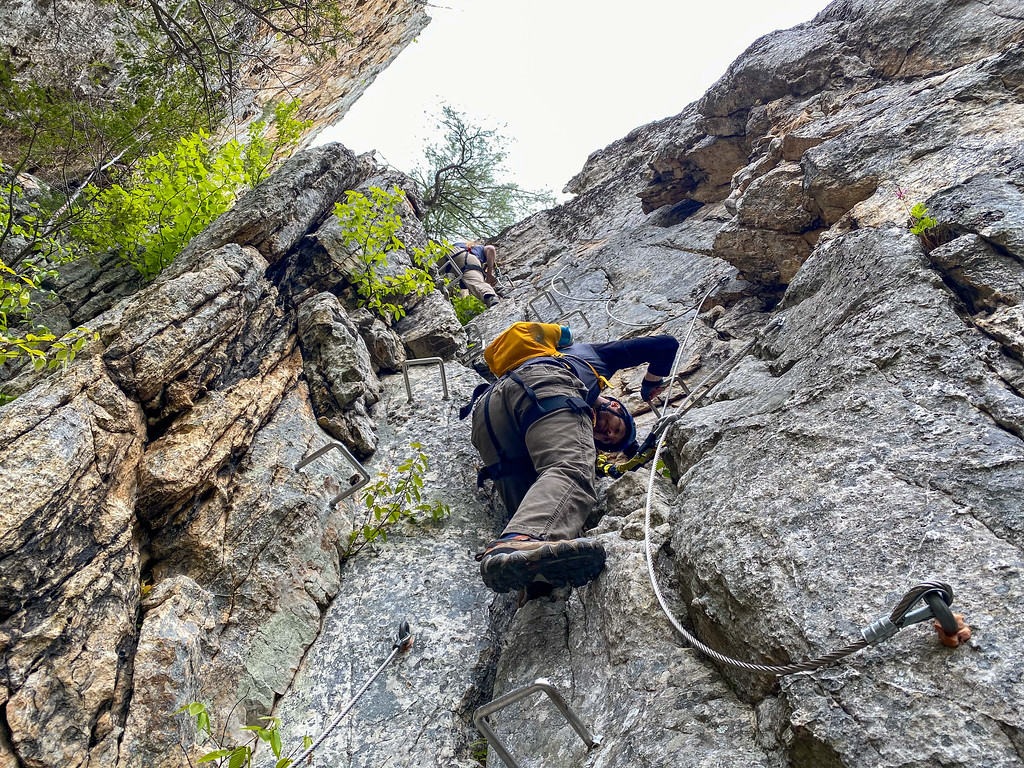
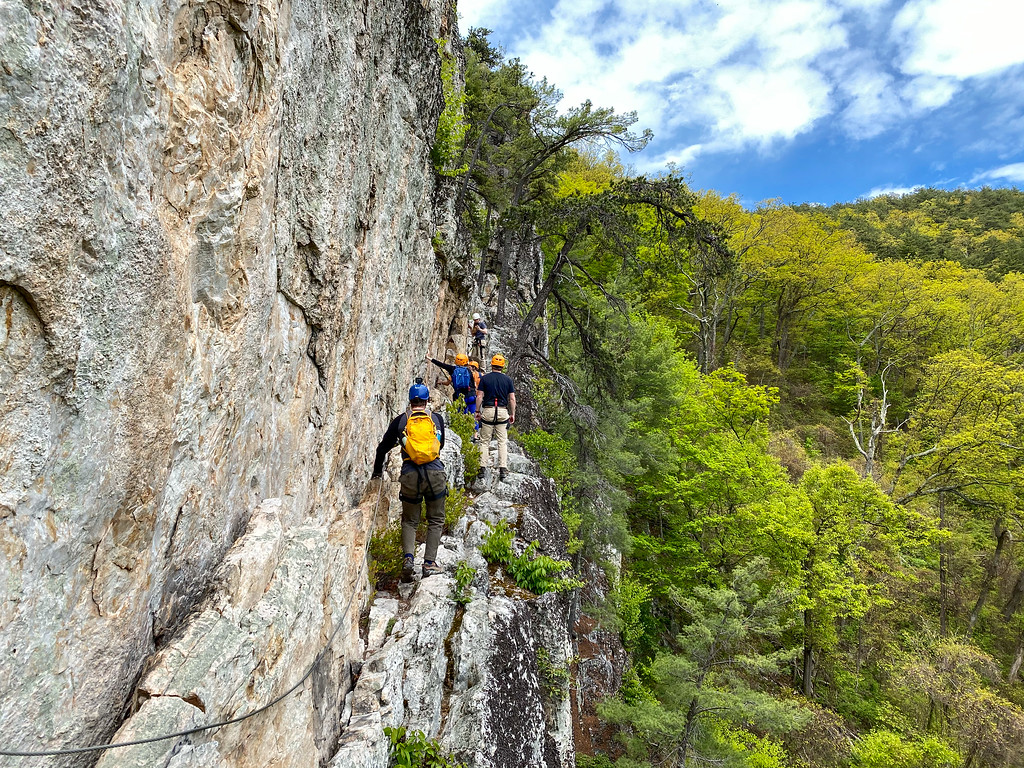
You’ll find most via ferrata routes/courses in Europe, but there are also a couple in the United States now – including the NROCKS course in West Virginia.
NROCKS via ferrata
If you’ve ever driven through eastern West Virginia, you may have seen some of the towering “fins” of Tuscarora quartzite that rise out of the landscape like the craggy backs of dinosaurs. These interesting razorback formations were formed by rock being folded more than 250 million years ago as the Appalachian Mountains were just settling into being.
Just up the road from NROCKS Outdoor Adventures is an area called Seneca Rocks, where rock climbers have long tested their mettle on one such fin. (There’s a visitor center there, as well as a hiking trail for anyone who decides the via ferrata is just not for them.)
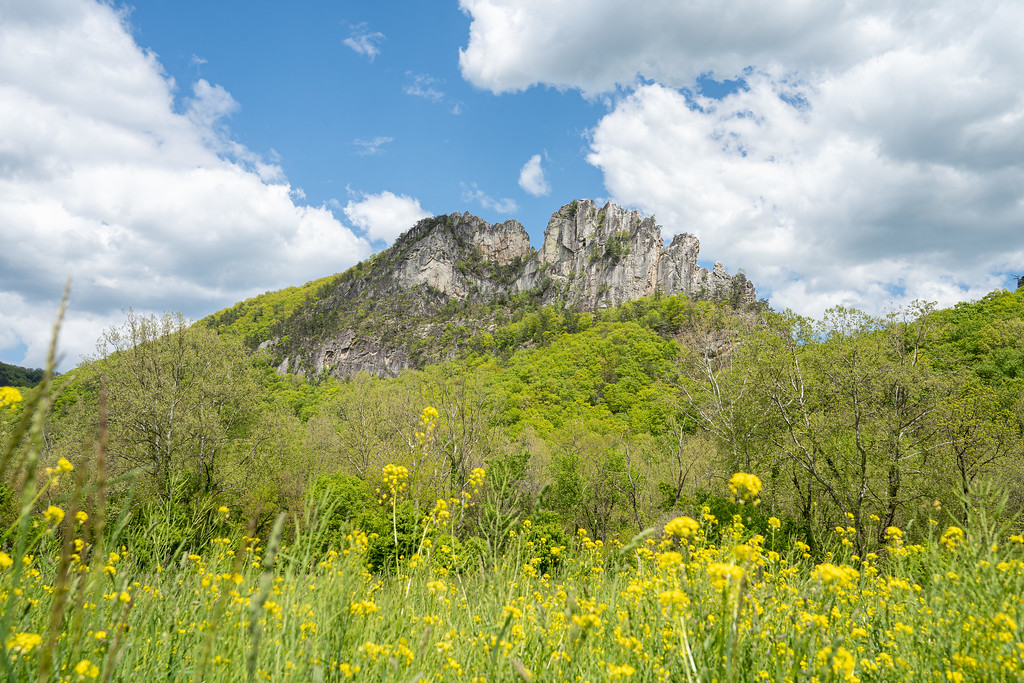
In 1997, a climber by the name of Stu Hammett bought the land that NROCKS sits on today (known simply as Nelson Rocks), and in 2001 decided he wanted to build his own via ferrata course.
In 2002, a team of “self-described ‘dirtbag’ climbers” (according to an article in Popular Mechanics) built the course in about six months, fixing 1750 feet of steel cable and 100+ steel rungs into the rock, and building a 200-foot-long suspension bridge. At the time, it was only the second via ferrata in the United States.
Stu eventually sold the property in 2009, which is when Endless Horizons bought it and renamed it Nelson Rocks Outdoor Adventures (which eventually got shortened to NROCKS).
NROCKS now operates the via ferrata, their expert adventure guides taking willing participants up and over two of those imposing fins of rock a couple times per day.
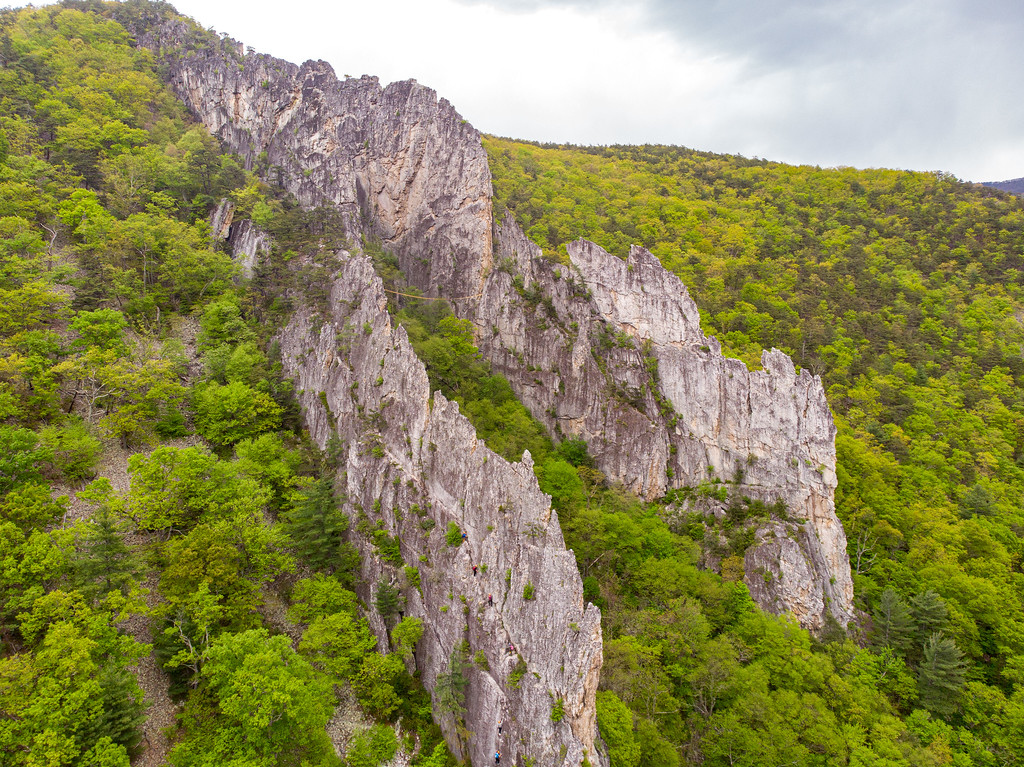
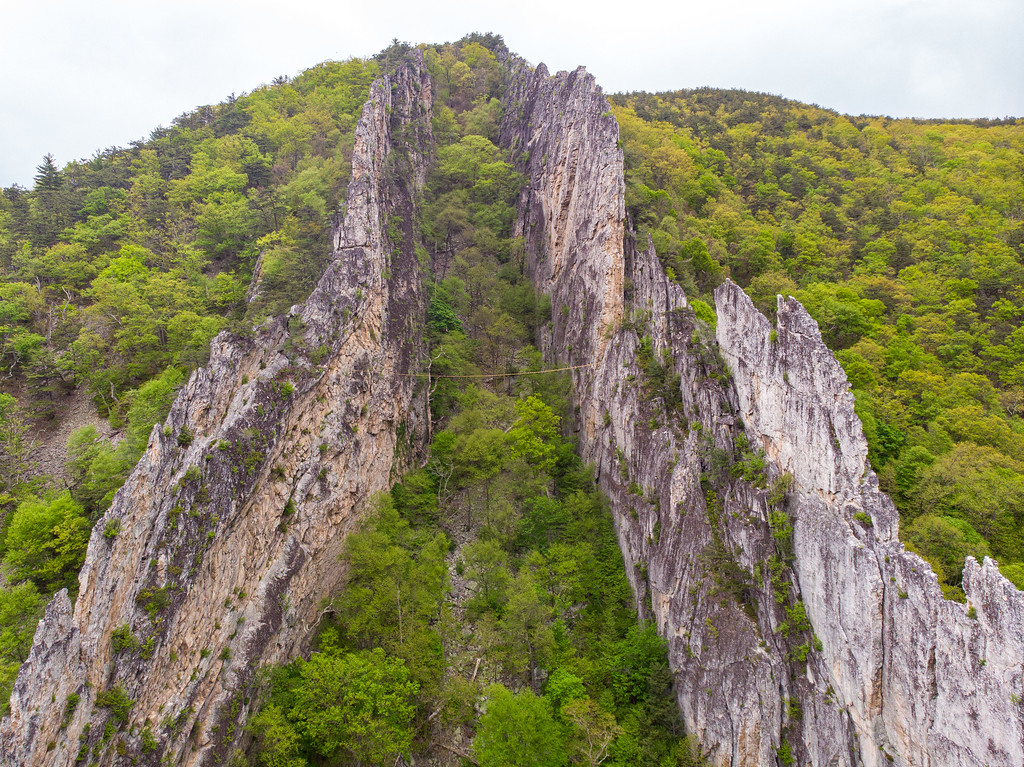
The course isn’t for the faint of heart – or those with more than a “healthy” fear of heights. Climbers are faced with several vertical rock faces, and you reach an elevation of about 1000 feet (though you’re usually never more than about 250 feet above the actual ground).
But if you’re like me and think this looks/sounds awesome, keep reading!
Check out this video of our via ferrata experience:
The via ferrata experience in WV
Somehow, even after showing him photos and videos of the course, Elliot agreed to try the NROCKS via ferrata with me. (He really doesn’t like heights, so I was pretty proud of him before we even left on our West Virginia road trip.)
We signed up for a morning tour, and arrived early on an overcast Friday to check in and get geared up in harnesses and helmets. (There were also safety waivers involved, though we filled those out before leaving home.)
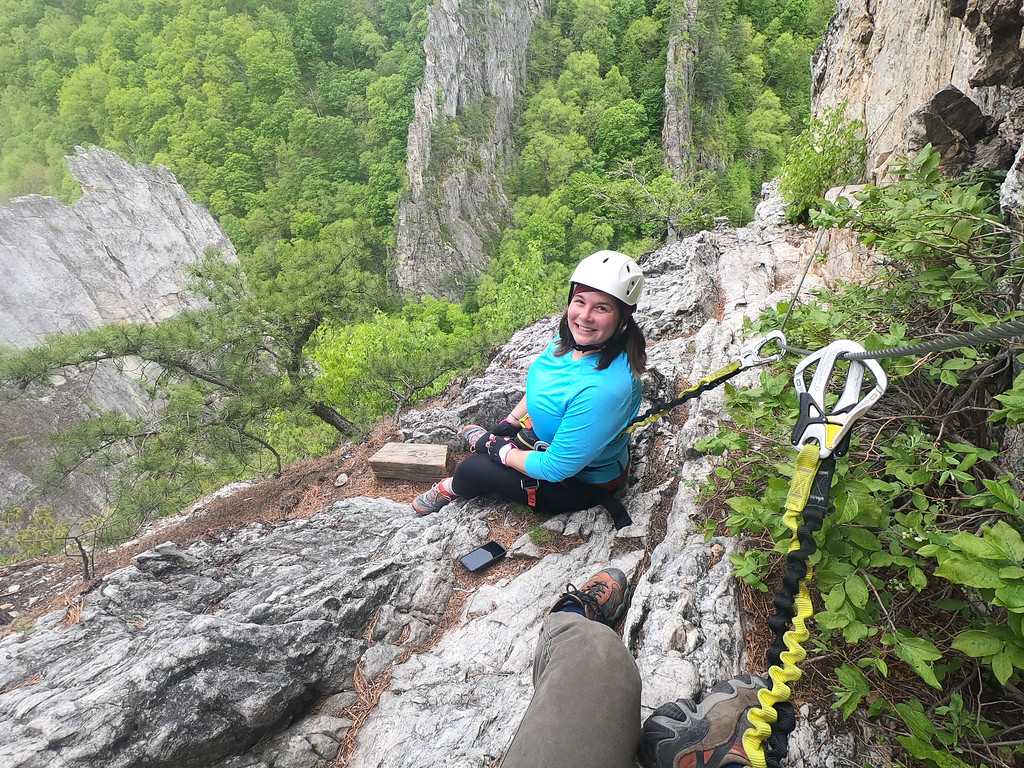
While this activity might look technical in photos, you don’t have to have any climbing experience in order to participate. All you need is a decent level of fitness, and the ability to follow directions in order to use your equipment correctly.
We met our guide Bryan and two other couples who we’d be climbing with, and soon set off on a short hike to get to the beginning of the course. Weighed down with climbing gear, this hike was actually one of the more difficult parts of the whole day!
After going uphill for about 15-20 minutes, we arrived at the base of the first fin we’d be tackling and basically dove right in. There’s no “easing” into this via ferrata; you start with a vertical climb straight away!
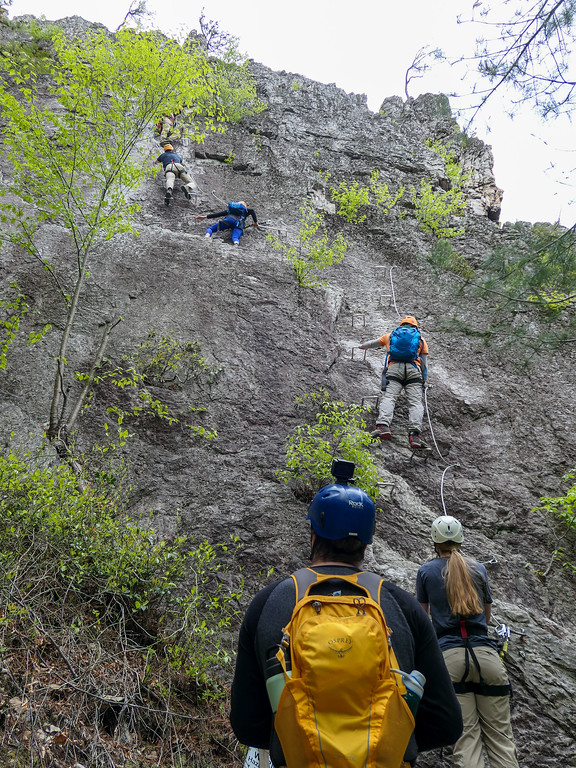
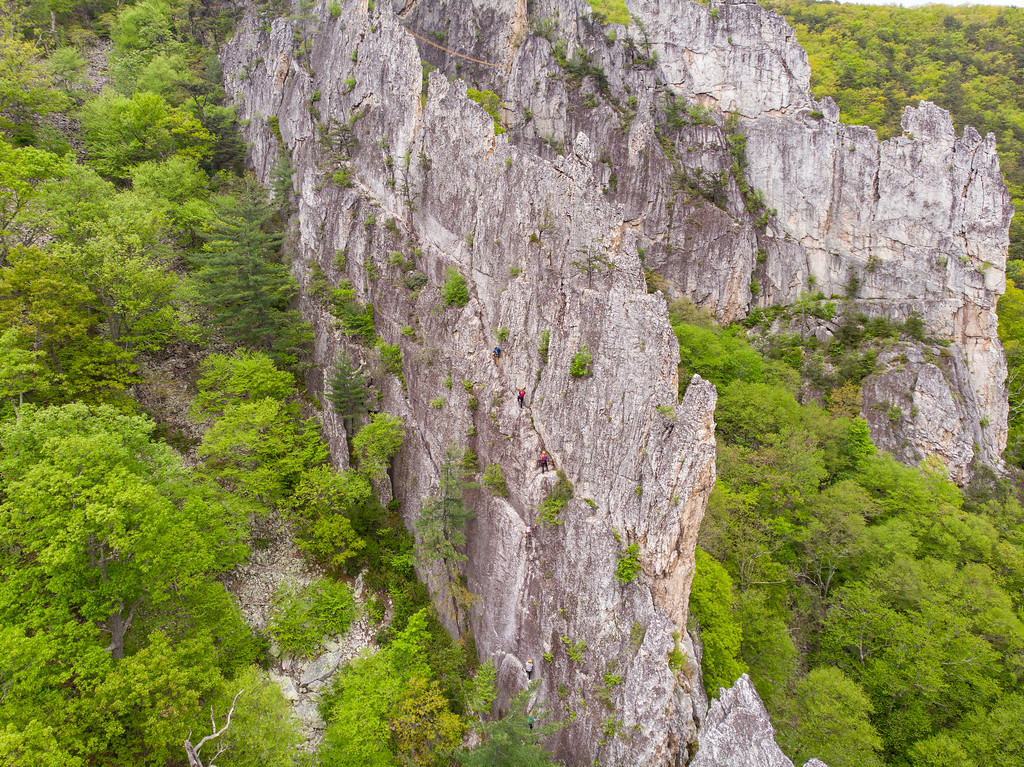
Before this, though, Bryan gave us a safety briefing, and showed us how to safely “hook in” to the course. Basically, you affix your two lanyards to the steel cable line using carabiners. The cable is fixed into the rock in sections, and when you get to a new section you have to move your clips, one at a time.
The only real rule on a via ferrata like this is that you must always, always have at least one of your lanyards attached at all times. As long as you follow that rule, you’ll avoid any serious falls/injury.
(And, for the record, they haven’t had any serious injuries on this course; in fact, our guide Bryan told us he thought the whitewater rafting trip we’d done a few days previously was way more dangerous!)
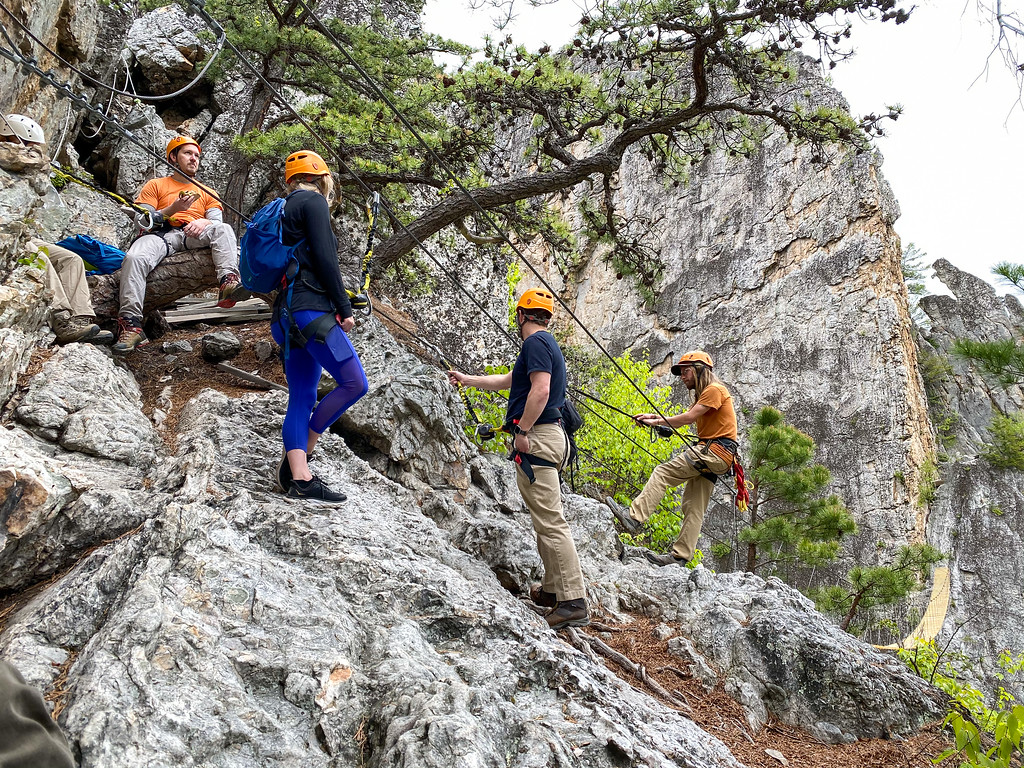
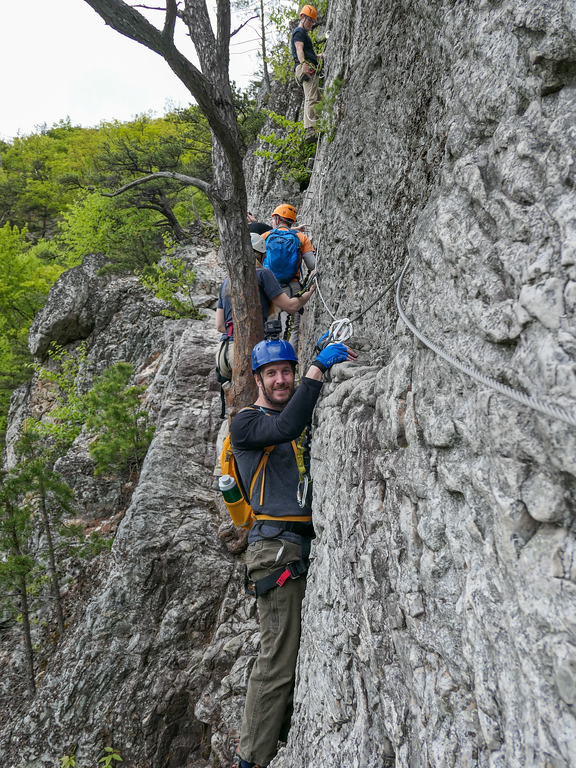
Our group started up the first rock wall, getting used to clipping in and out while using the ladder-like steel rungs to climb. My short legs made things a little more difficult for me, but I didn’t get stuck anywhere and was having fun from the moment I clipped into that cable.
We climbed up and to the left on the first fin, and then passed through a notch near the top of the rock. This is where we came across that exposed section that Elliot found pretty terrifying, but it didn’t last long before we had rock under our feet again.
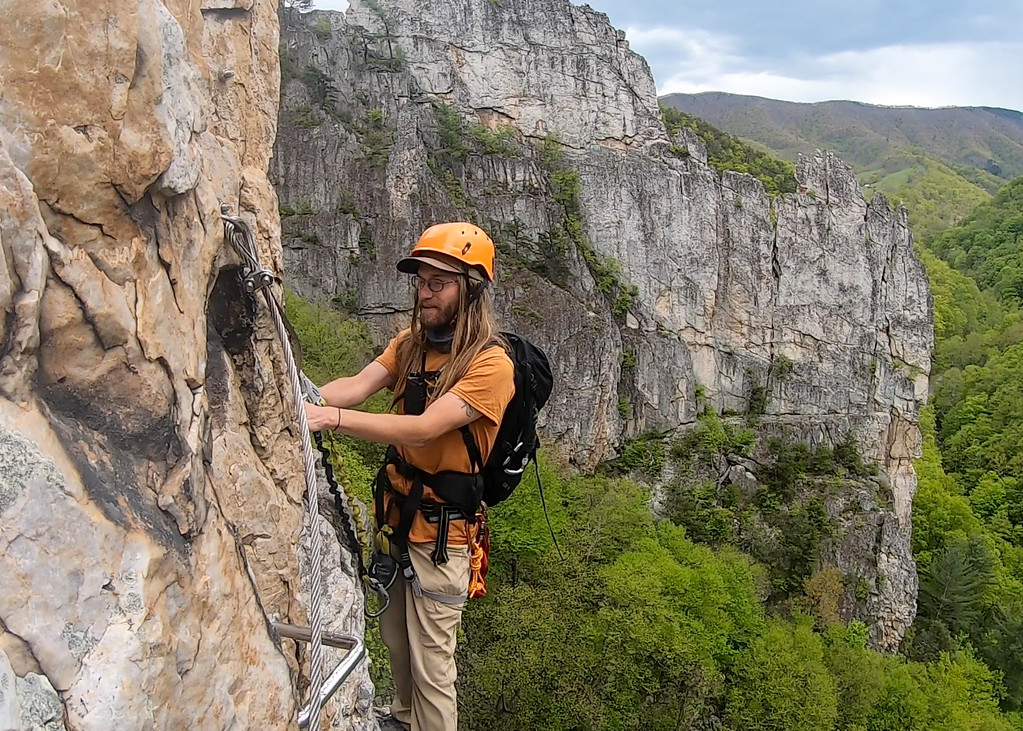
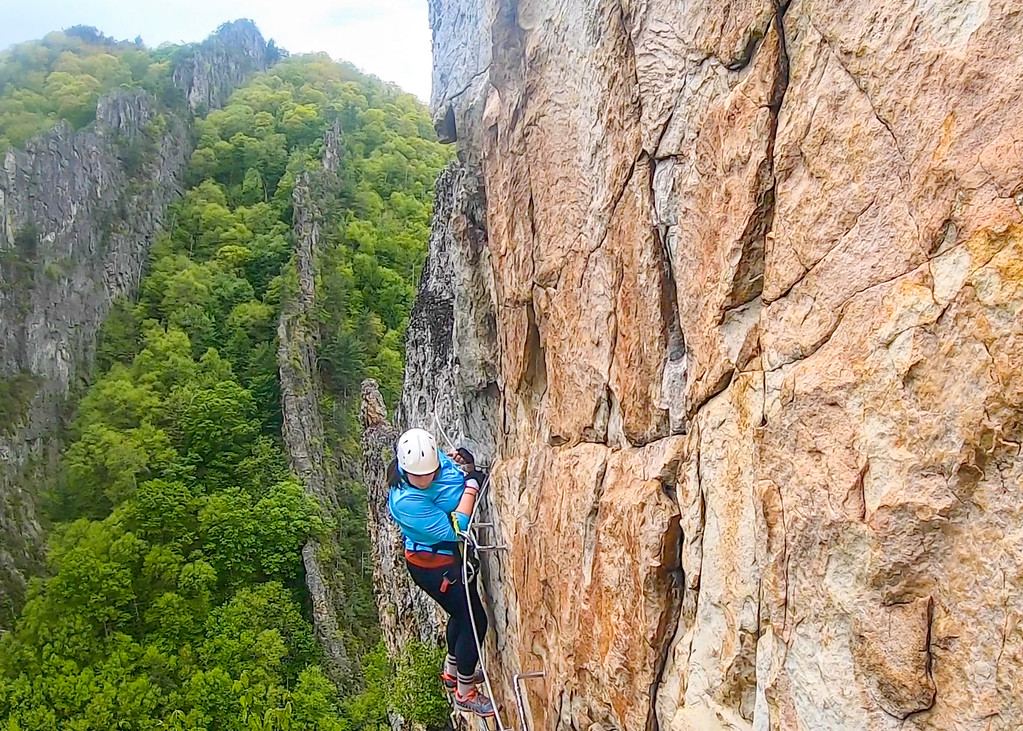
We took a short break at this point, and Bryan told us that we had one last chance to take an “escape route” if we were feeling shaky on the course. Plenty of people do take this option when they see the next obstacle: the 200-foot-long suspension bridge that takes you over to the second rock fin.
This bridge looks like something you’d expect to find in an Indiana Jones movie. It hangs 150 feet above the ground, and is made of a few cables and wooden planks spaced about 16 inches apart.
No one in our group wanted to bow out, though, and we soon made our way across the bridge a couple at a time.
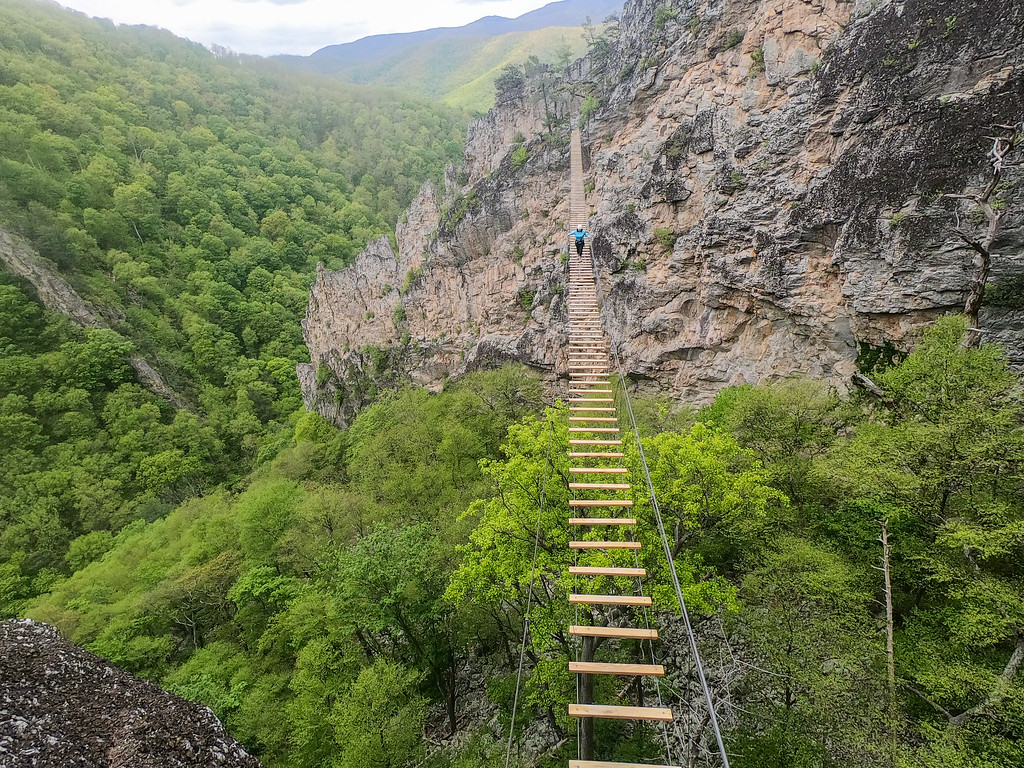
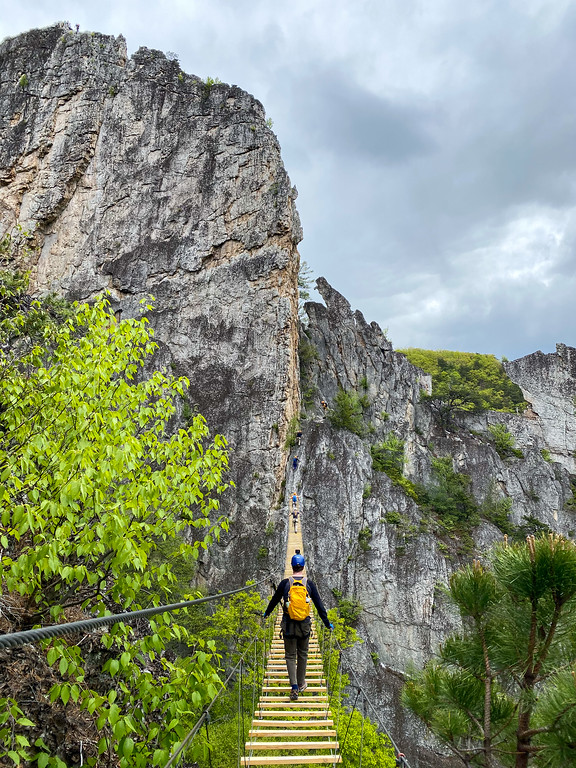
You’re clipped in on the bridge, too, so there’s no risk of falling, but it certainly is an adrenaline rush anyway since you can see through the bottom and feel it swaying and bouncing as you walk.
We climbed up the second fin, and then reached an optional extra climb. The extra climb is an additional 100 vertical feet up, with a bit of an overhang at the top.
I decided to skip this one since Bryan was honest and said it would probably be hard for me at my shorter height. But Elliot set aside his fears and went up to the very top with the rest of the group.
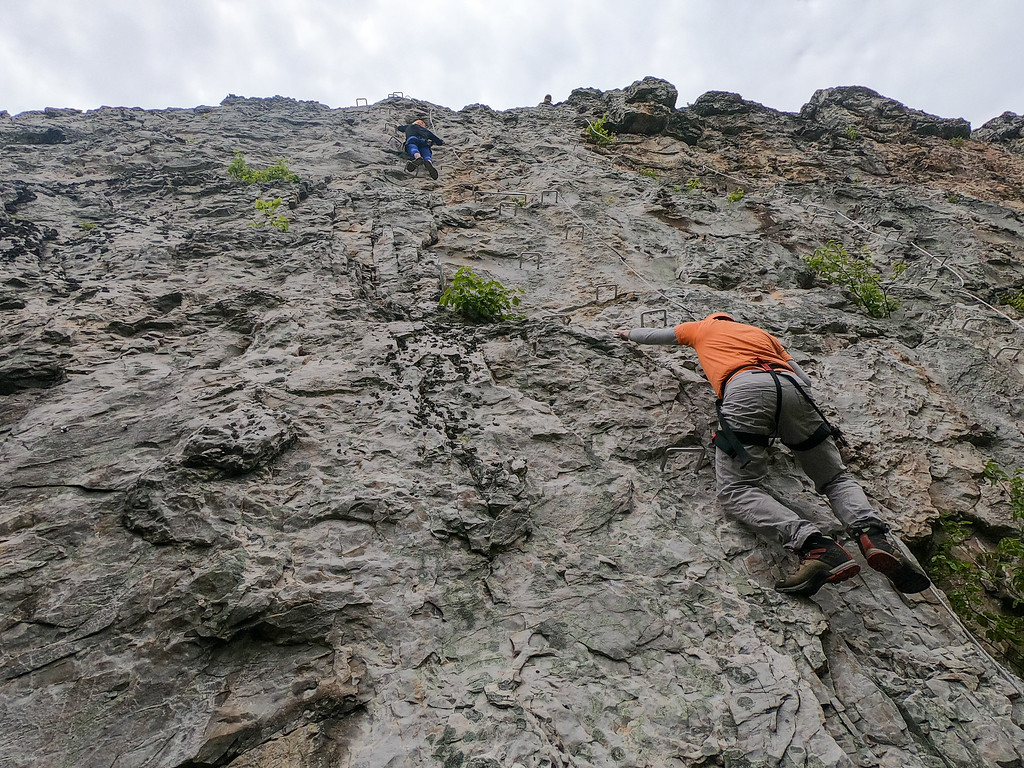
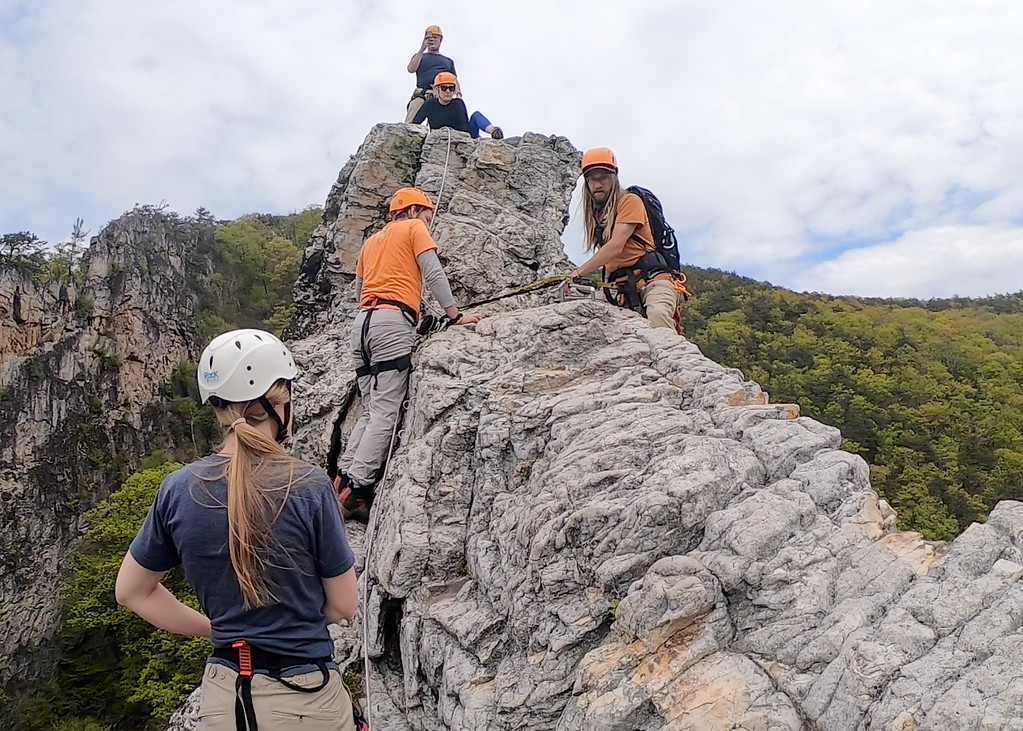
Once the group came back down, we had some more scrambling up the far side of the second fin to do before reaching the end of the course.
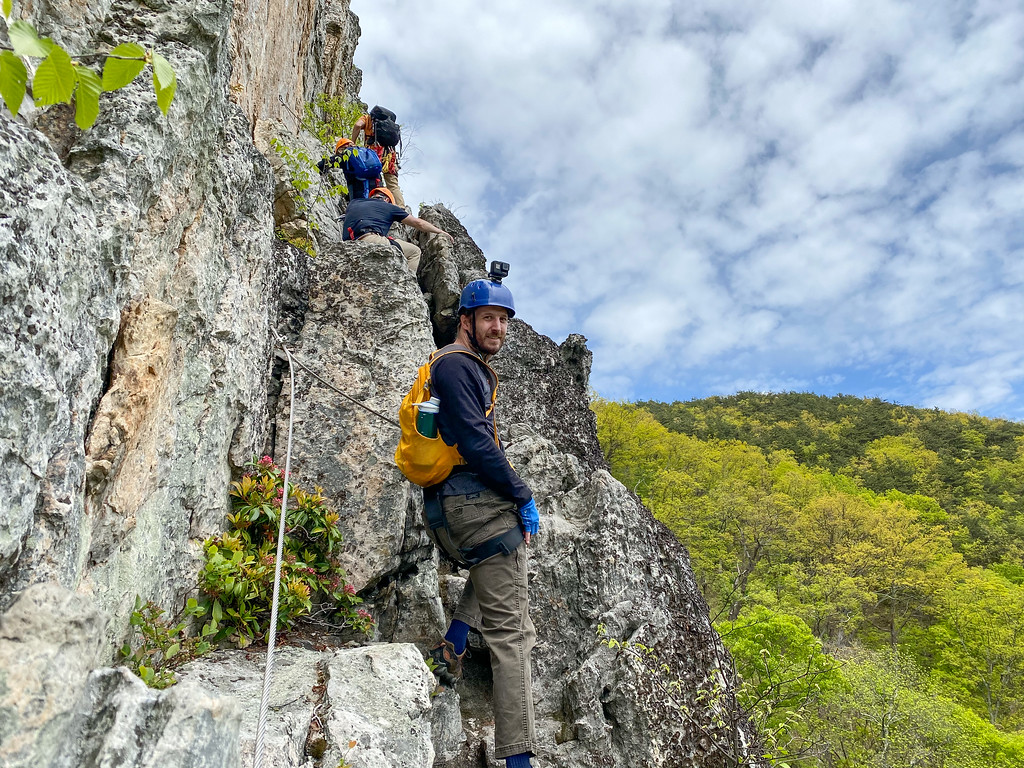
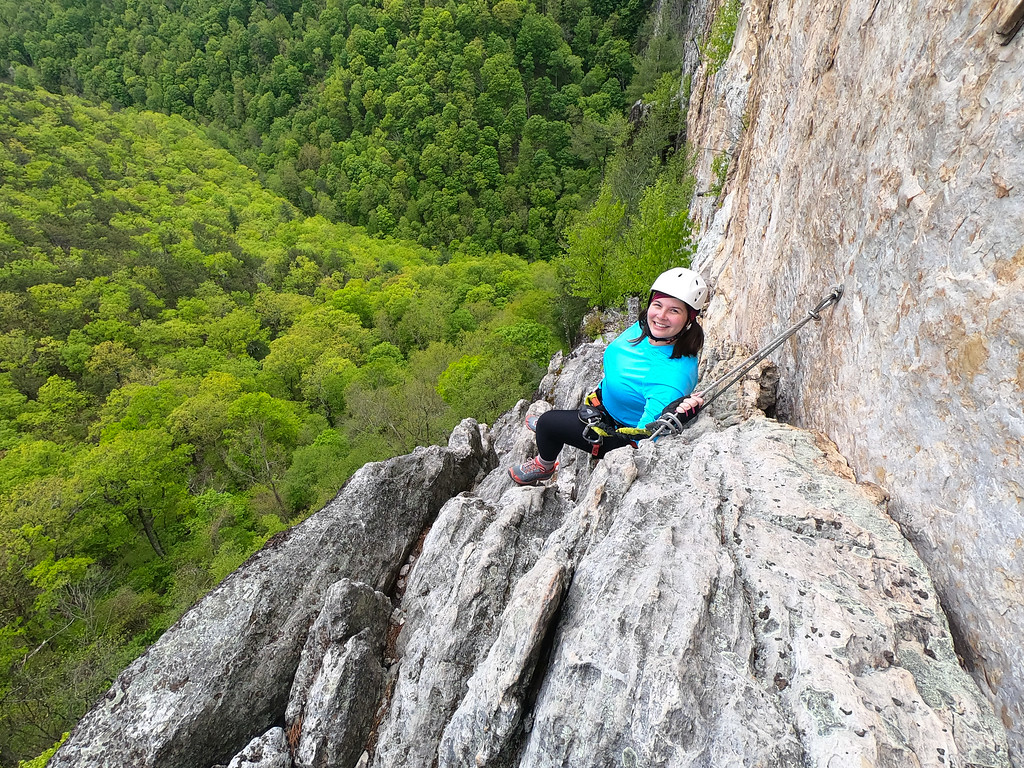
When we clipped out and stepped back onto packed earth at the end of the course, we were basically on top of a small mountain. One last short hike took us up to a lookout point above both fins, which made our achievement seem even more impressive.
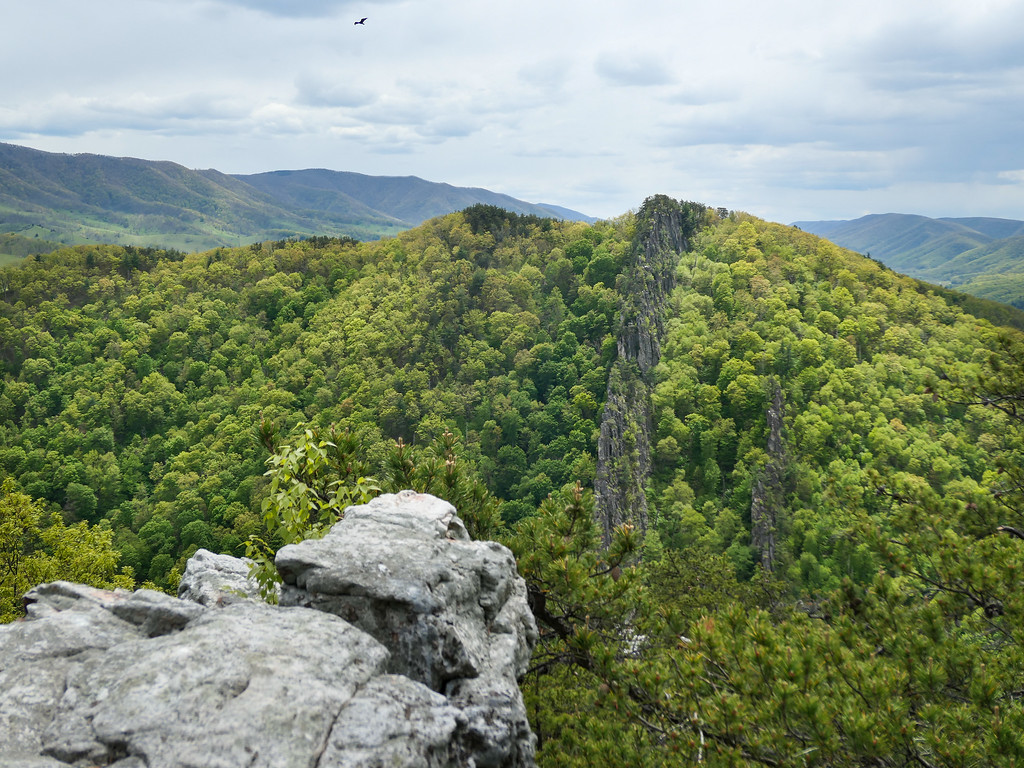
But don’t worry: you don’t have to climb back down the fins. Instead, you’ll hike partway down on a steep trail through the forest, and then catch a ride the rest of the way down in a bus or 4WD vehicle.
In all, we only climbed about half a mile up the fins. NROCKS says the course can take anywhere from 3.5-5 hours on average, and our group finished in about 4 with a couple short breaks for water/snacks.
How hard is this via ferrata, really?
When I first saw photos of this via ferrata, I was immediately sold on doing it. But I’m not going to lie to you: I was a little worried about whether I *could* do it.
I’m in fairly decent shape cardio and muscle-wise (thanks, at-home HIIT workouts, and former-gymnast calves and thighs), and I knew I was well within the weight range required for the climbing gear.
But I’m short and rather curvy, and I didn’t see any people who looked like me in any of the photos NROCKS (or anyone else) had shared of the via ferrata course. Could a chunky-yet-adventurous woman complete this course?
Well, the answer is yes.
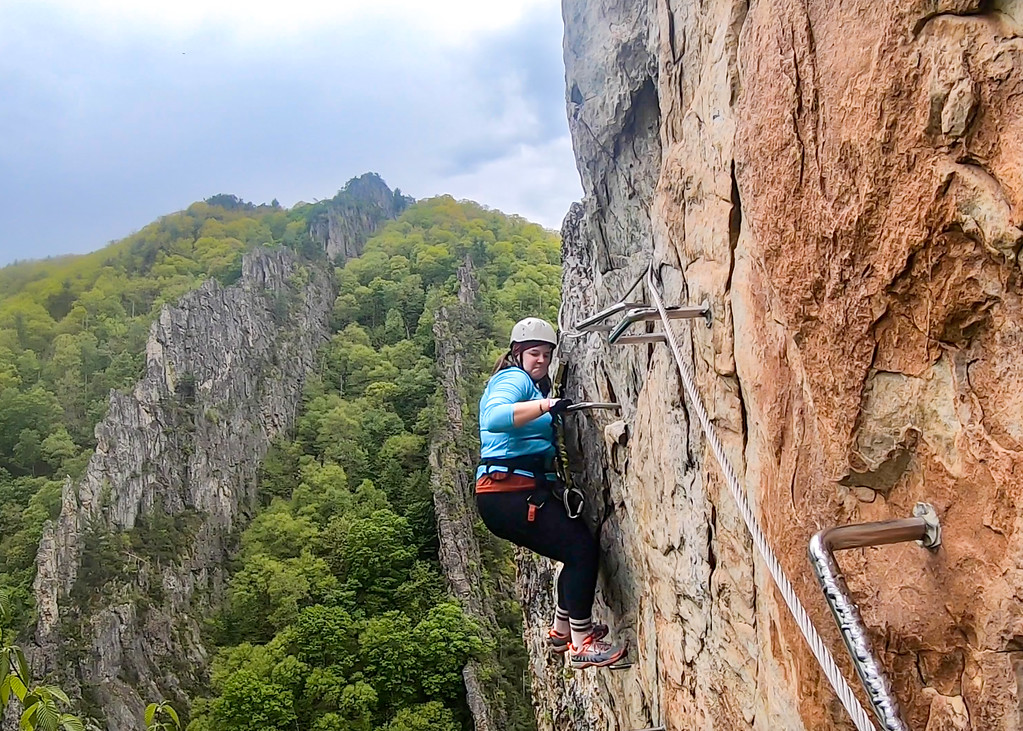
While there were definitely some sections of the course that were more challenging for me because of my height (for example, I skipped that extra optional wall climb), I didn’t run into any major issues or get stuck anywhere.
(Though I will say that my flexibility definitely helped me navigate some of the trickier sections!)
The course IS physically demanding. You’re not climbing those ladder-like rungs the whole time, but you’re using your arms and legs frequently to push and pull yourself up, and your core and feet to keep yourself balanced on lots of uneven surfaces. I was tired by the end.
You don’t have to look like a rock climber to do this via ferrata, though. Here are more photos of me, an exceedingly average-looking American woman, successfully doing this course:
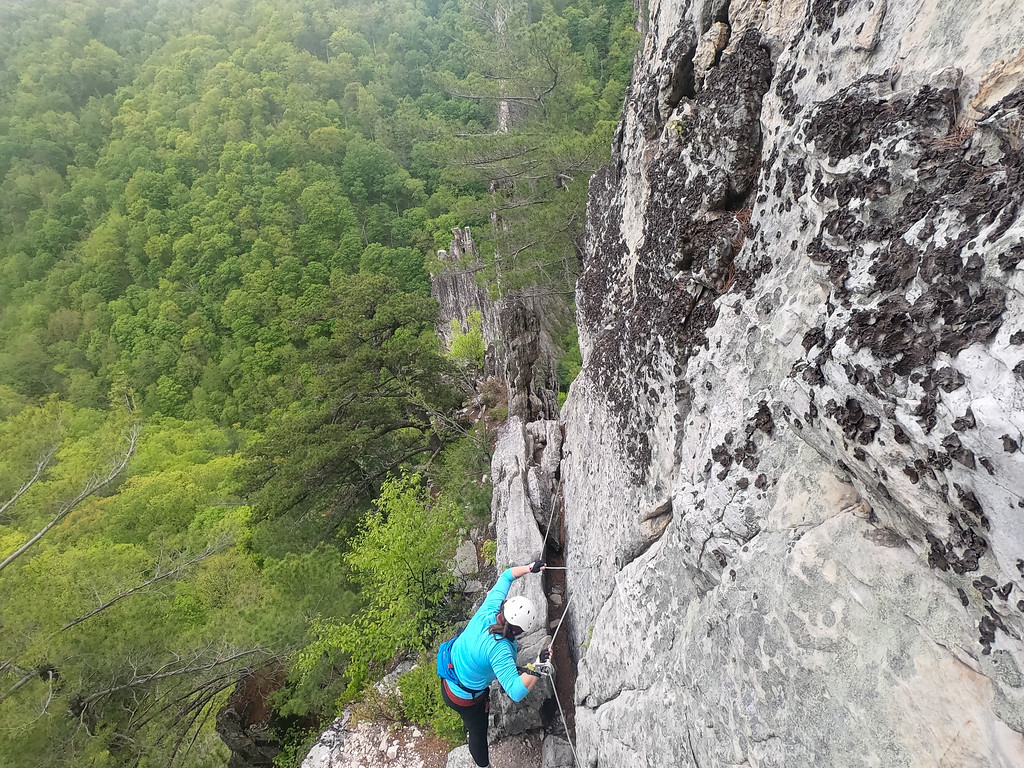
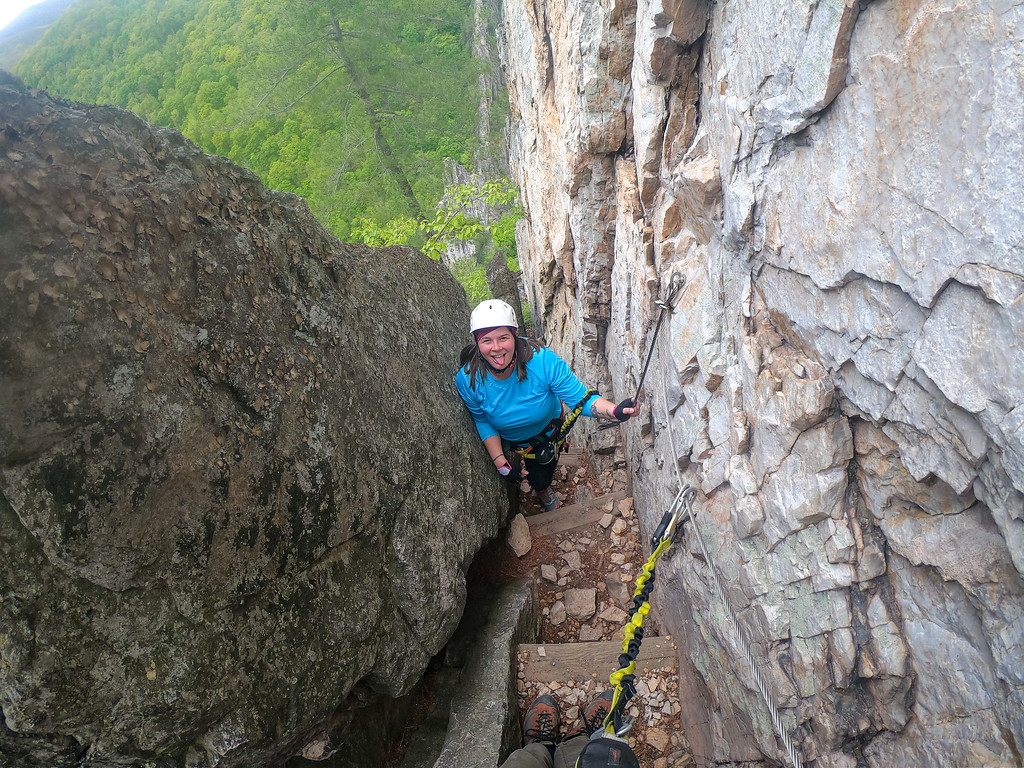
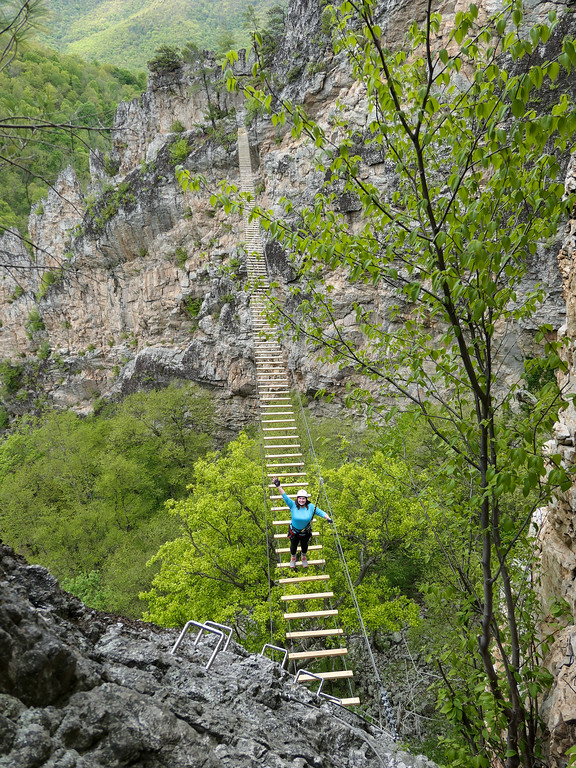
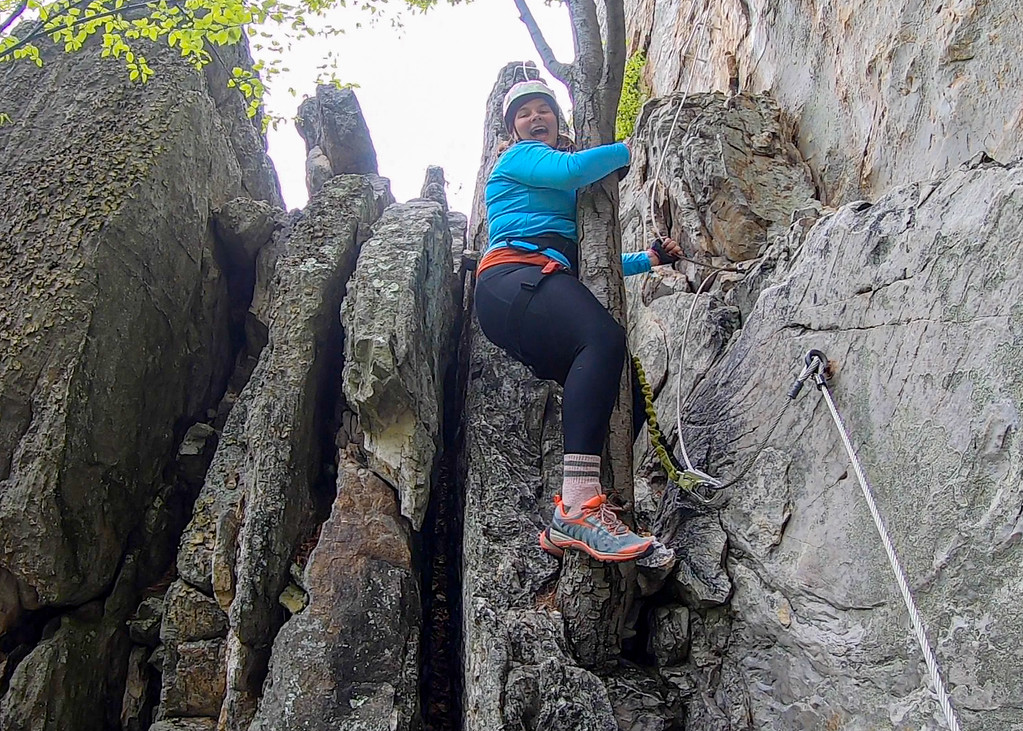
If this looks fun to you, then you should absolutely try it! It’s probably one of the most unique activities I’ve done while traveling in the US.
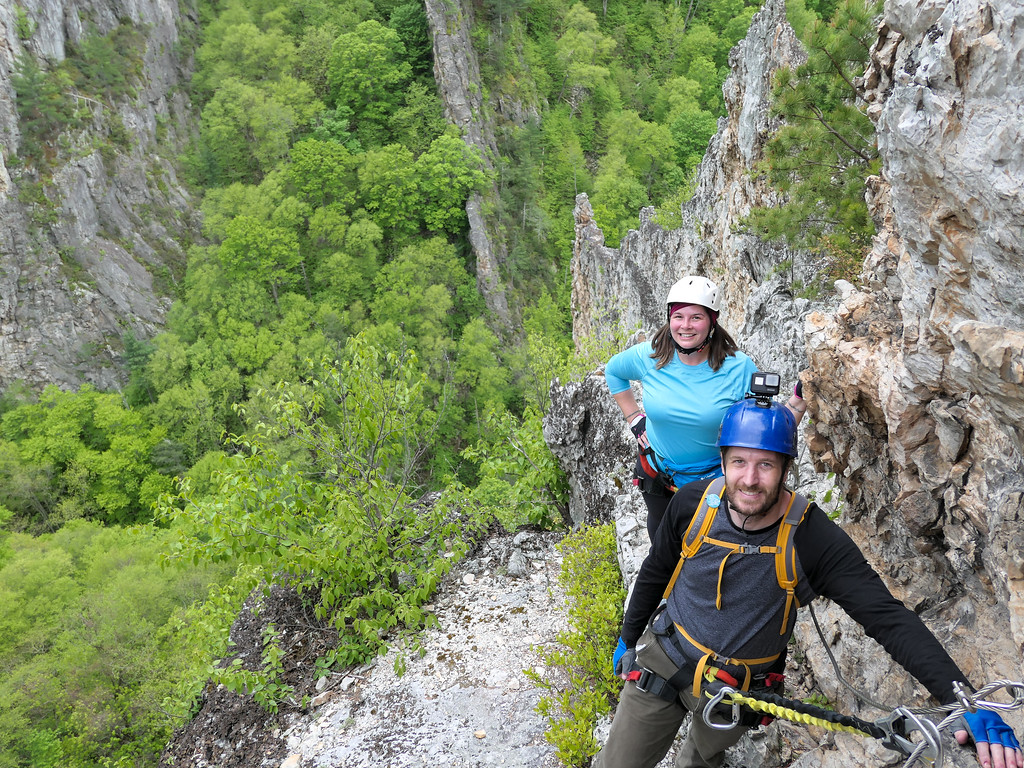
NROCKS via ferrata essential info
Think you might like to book this adventure for yourself? Here’s everything you need to know.
Where: NROCKS is located in Circleville, West Virginia. It’s kind of in the middle of nowhere with very spotty cell service, so you might want to grab an offline map before you head there.
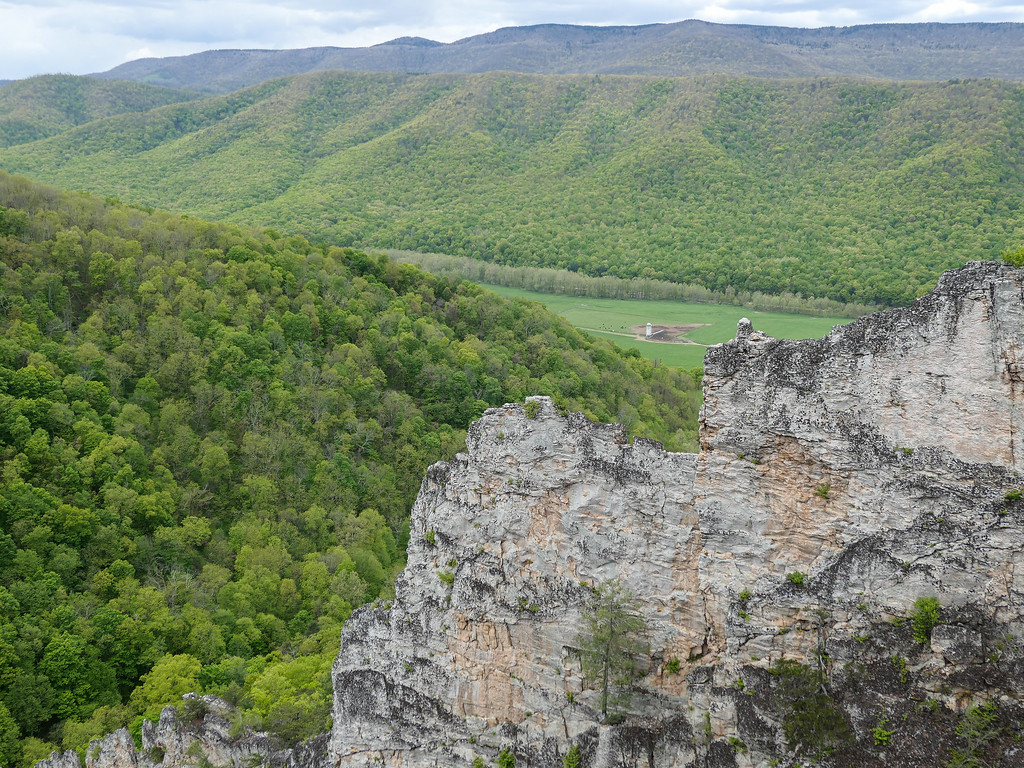
When: You can book this via ferrata year-round; they run tours every day of the week from April through the end of October, and offer tours Friday-Sunday during the winter months. There are usually a couple different tour times to choose from each day.
How much: This activity costs $125 per person during the high season, and $80 per person during the low season.
How long: Most groups take between 3.5 and 5 hours to complete the course (it took our group 4 hours).
How to book: Book with NROCKS online.
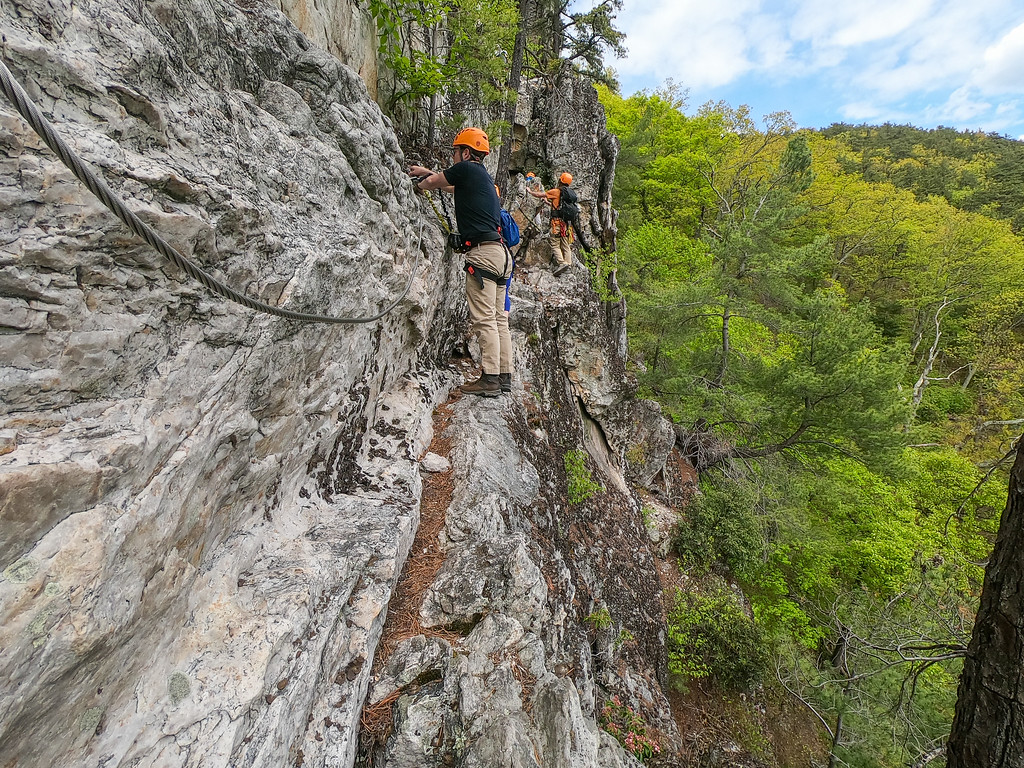
Any limitations? Participants need to be 13 or older, and weigh between 88 and 265 pounds in order to safely use the climbing equipment.
What to bring: You don’t need to bring any climbing gear, as a harness and helmet will be provided. But you should plan to be up on the rocks for at least 4 hours, and bring everything you might need during that time. A few things I’d be sure to bring include:
- Good hiking shoes – You need close-toed shoes for this activity, and I would recommend hiking shoes with good grip on the bottom. Hiking boots are fine, but I actually found lower hiking shoes to be better since you want your ankles to be able to flex easily. I wore my Merrell Siren Edge 3 shoes, and Elliot wore his Oboz.
- Sun protection – Most of this via ferrata course is open to the elements, and you’ll definitely spend time in the sun if it’s a clear day. Sunscreen, sun glasses, and a hat are definitely recommended.
- Long pants – What you wear on top will probably depend on the weather forecast, but I would recommend long pants on the bottom even if it’s hot out. You’ll probably scrape your knees against the rock at least a few times, and long pants will help you avoid scratches.
- Gloves – NROCKS recommends fingerless gloves for this activity, too, to help you grip the rungs better and protect your hands as you grab onto cables and pointy rocks. Elliot wore a pair of paddling gloves, and I brought my bike gloves with me. You don’t absolutely *need* these, but I think they did help!
- A day pack – You’ll want to bring water (1-2 liters per person), snacks or a lunch, sunscreen, a camera, and maybe an extra layer with you. A day pack is pretty much essential. Elliot carried our water and snacks in his Osprey Daylite backpack, while I climbed with my phone and small camera in my Columbia hip pack.
- A camera – I did NOT bring my big Sony camera with me on the via ferrata, because I knew it would be too cumbersome to climb with and too annoying to have to keep pulling out of a backpack. I took my phone and a small point-and-shoot camera, and Elliot attached our GoPro to his helmet (ask for a helmet with a GoPro mount). We sent the drone up after our climb to get additional photos and video.
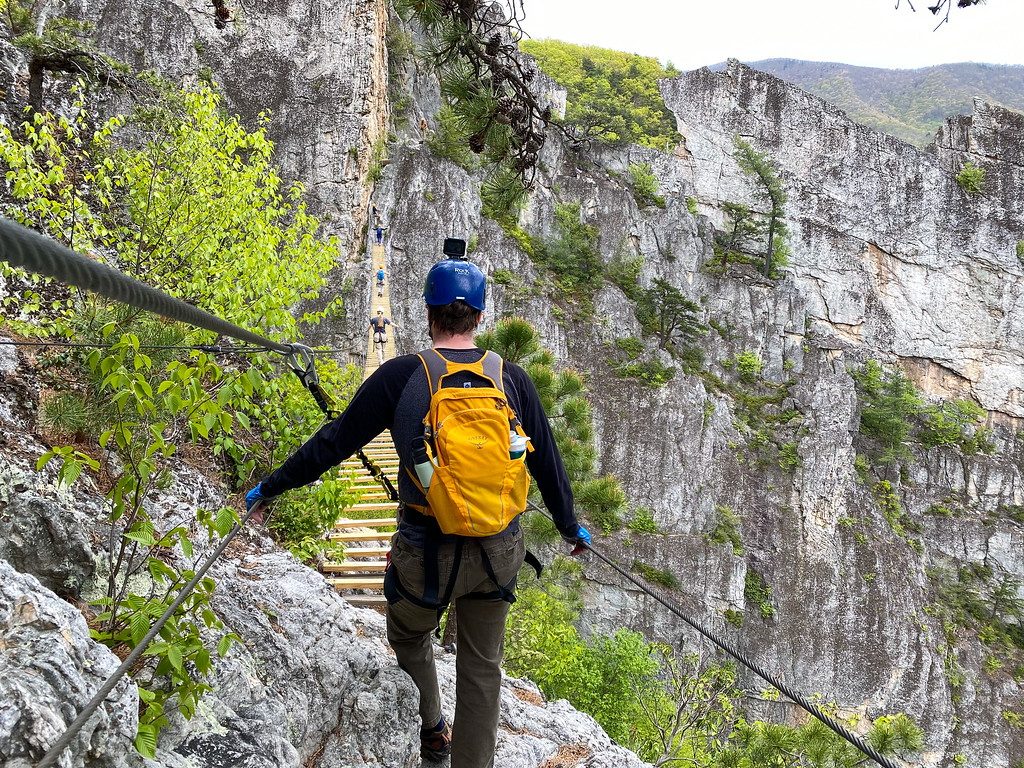
What if I get scared? You do want to make sure that you’re physically and mentally fit enough for this activity before booking. But if you think you’re ready and get up on the course and realize it’s not for you, there are two “escape routes” built in – one right near the beginning, and another before the suspension bridge.
